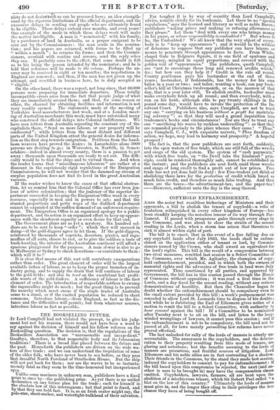COPYHOLD ENFRANCHISEMENT.
AMID the noisy but resnitless biekerings of Ministers and their opponents, a bill to abolish the tenure of oopyhold—a relic of feudalism relinquished in every other kingdom of Europe—has been steadily keeping the noiseless tenour of its way through Par- liament. It passed with prosperous gales through every stage in the Commons, and was about to clear the straits of the second reading in the Lords, when a storm has arisen that threatens to sink it almost within sight of port. The bill is to enact, that in the event of a fine falling due on any copyhold lands after July 1843, the lands shall be enfran- chised on the application either of tenant or lord, by Commis- sioners named by the Crown, who shall award an equivalent for the lord's rights. This bill is the result of a compromise between two rival measures, remitted last session to a Select Committee of the Commons, over which Mr. Aglionby, the champion of copy- hold enfranchisement, presided, and in which both the owners of manorial rights and the advocates of free trade in land were duly represented. Thus sanctioned by all parties, and approved by Government, the bill has in this session passed through the House of Commons without opposition; it was read a first time in the Lords, and a day fixed for the second reading, without any serious demonstrations of hostility. But then the Chancellor began to doubt whether the enfranchisement should be compulsory even to the small extent provided by this bill : a week's postponement was conceded to allow Lord St. Leonards time to dispose of his doubts; and while he is dubitating the Earl of Ellesmere gives notice of a motion to remit the bill to a Select Committee, with authority to hear counsel against the bill ! If a Committee to be nominated after Tuesday next is to sit on the bill, and listen to the long- winded wranglings of lawyers, it cannot pass this session ; and if the enfranchisement is not to be compulsory, the bill need not be passed at all, for laws merely permitting law reforms have never proved effectual.
The last unlooked-for rally of the lords of manors is utterly un- accountable. The annoyance to the oopyholders, and the deterio- ration to their property resulting from this mode of tenure, are glaring and notorious; but the benefits accruing to the lords of manors are precarious, and fruitful sources of litigation. Lord Ellesmere and his noble allies are in fact contending for a shadow. Their friends in the Commons, by the stand they made last session., induced the eopyholders to consent to pay for enfranchisement : if the bill based upon this compromise be rejected, the next (and an- other is sure to be brought in) may have the compensation clause omitted. Copyholders, lawyers, farmers, all are bent upon the abolition of a mischievous tenure, which Sir Robert Peel called "S blot on the law of this country." Ultimately the lords of manors must give in, and the longer they cling to their privileges the less chance they have of being bought off.


























 Previous page
Previous page